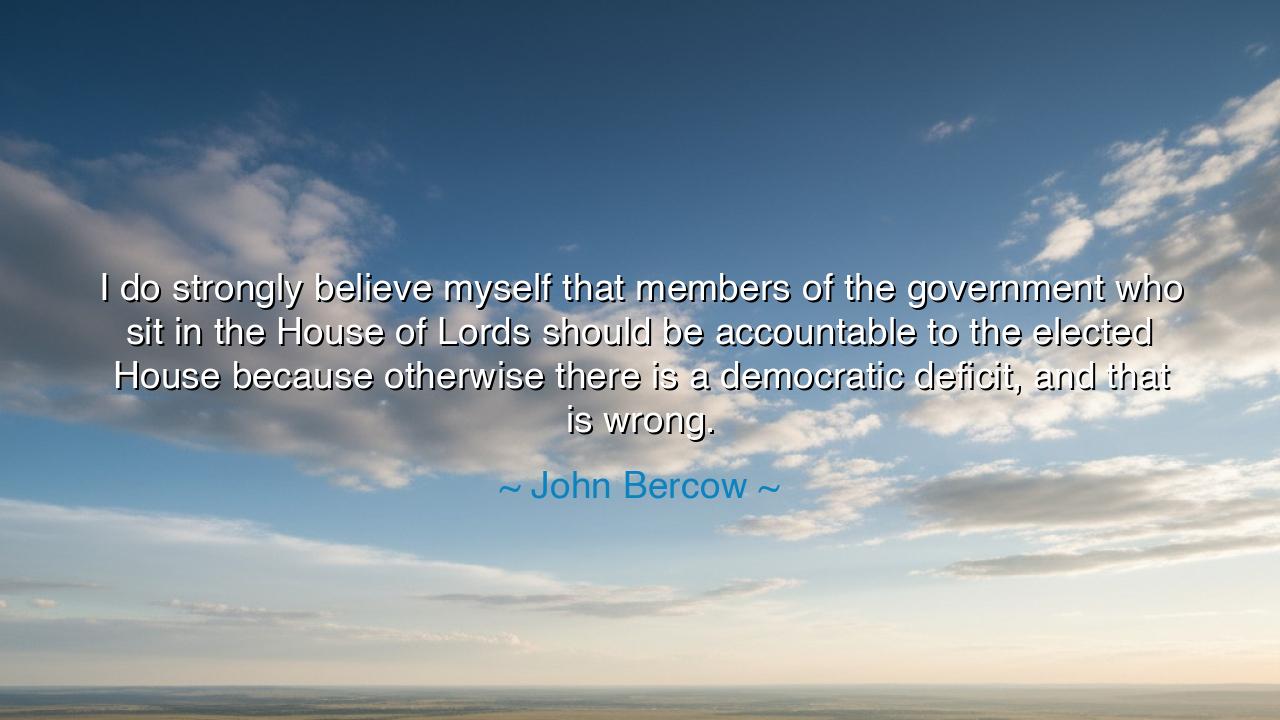
I do strongly believe myself that members of the government who
I do strongly believe myself that members of the government who sit in the House of Lords should be accountable to the elected House because otherwise there is a democratic deficit, and that is wrong.






In the solemn chambers of Westminster, where the echoes of history mingle with the murmur of debate, John Bercow, once Speaker of the House of Commons, uttered words that resonate with the enduring spirit of democracy: “I do strongly believe myself that members of the government who sit in the House of Lords should be accountable to the elected House because otherwise there is a democratic deficit, and that is wrong.” These are not mere words of procedure or policy; they are the cry of conscience from a man who spent his life guarding the sanctity of parliamentary rule. Beneath their formality lies a truth as old as liberty itself: that power, wherever it resides, must answer to the people.
To understand the meaning of Bercow’s declaration, one must first know the world from which it arose. The House of Lords, ancient and noble, stands as one of the oldest legislative bodies on earth—a chamber of wisdom, tradition, and reflection. Yet it is not elected; its members are appointed, inheriting or receiving their place by favor or merit rather than by the voice of the people. The House of Commons, by contrast, is the beating heart of Britain’s democracy, chosen by the citizens themselves. When Bercow warns of a “democratic deficit,” he speaks of a danger that haunts every free society: that authority might drift too far from accountability, and that governance might be shaped by those who do not answer to the governed.
The ancients knew this peril well. In the republics of old—Athens and Rome—great thinkers warned that when rulers cease to answer to those they rule, tyranny creeps in like shadow at sunset. Aristotle called it the corruption of democracy; Cicero, the death of the republic. The voice of the people, once silenced, becomes a whisper, then an echo, and finally—nothing at all. Bercow’s warning is the modern echo of that ancient truth: that power without accountability is an affront to justice, and that no title, no tradition, no ancestry can excuse the failure to answer to those from whom power ultimately flows.
History offers us countless lessons in the cost of unaccountable authority. Consider the days before the English Civil War, when kings ruled by divine right, dismissing Parliament as an inconvenience. The cry of the people—“No taxation without representation!”—was not born in the American colonies, but in England itself, in the hearts of citizens who demanded that power answer to consent. When government forgot this duty, the nation fell into war, and the head of Charles I rolled as a grim reminder that even kings are servants of the people’s will. From that storm of conflict arose the principle that would define modern democracy: that those who make decisions in the name of the people must be accountable to the people.
Thus, when Bercow insists that members of government who sit in the Lords must answer to the Commons, he is not merely speaking of parliamentary etiquette—he is defending the foundation of democracy itself. For a government that hides behind unelected chambers risks losing the trust of its citizens. The democratic deficit he condemns is more than a gap in representation; it is a wound in the body of freedom. When power ceases to be answerable, corruption grows like rot beneath the surface, unseen until it devours the core. To heal that wound, Bercow demands transparency, humility, and the courage to face questioning before the elected voice of the people.
The deeper wisdom of this statement extends far beyond the walls of Parliament. In every sphere of life—whether in government, business, or family—the principle remains the same: wherever there is power, there must also be responsibility. The teacher is accountable to the student, the judge to the law, the leader to those who follow. Without this balance, authority becomes arrogance, and service becomes dominion. It is accountability that purifies power, turning it from a weapon into a trust. For the moment a leader forgets that they serve others, they cease to lead and begin to rule.
And so, my children of the modern age, take heed of John Bercow’s lesson. Guard your democracy not only with laws and votes, but with vigilance and virtue. Question those who lead you—not to defy them, but to remind them that they are stewards, not masters. Demand transparency where secrecy thrives, and courage where complacency reigns. In your own life, too, live as one accountable—to your family, your conscience, and the truth. For the health of any nation, or any soul, lies not in unchallenged authority, but in the honest reckoning of one’s deeds before the light of truth.
Thus, let it be remembered: freedom endures only when power is answerable, and the dignity of democracy is preserved not by ceremony, but by courage. When the mighty answer to the humble, and the unelected to the elected, the nation stands firm. But when pride silences accountability, liberty begins to fade. So walk always in the wisdom of Bercow’s words—question freely, hold power to account, and let no authority go unexamined—for in that vigilance lies the eternal safeguard of freedom.






AAdministratorAdministrator
Welcome, honored guests. Please leave a comment, we will respond soon